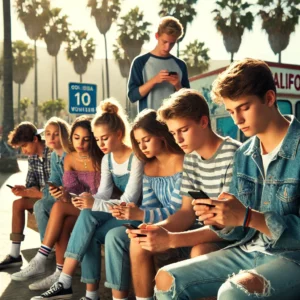Senate Passes Bipartisan Legislation Targeting Teen Social Media Use
The Washington state Senate approved legislation on March 12, 2025, to shield teenagers from the potentially harmful effects of popular social media platforms. Senate Bill 5708 passed with strong bipartisan support, receiving 36 votes in favor and 12 against. The bill targets explicitly addictive feeds and push notifications during school hours and implements mandatory time limit options for users. The measure now requires House approval before becoming law in a state facing growing concerns about youth mental health.
5 Key Points
- Senate Bill 5708 blocks companies from creating addiction-driving algorithms for minors
- The bill restricts push notifications during school hours and between midnight and 6 a.m.
- Platforms must allow all users to set time limits and block “likes” displays
- Attorney General Nick Brown requested the legislation with Governor Bob Ferguson’s support
- Similar laws in California currently face legal challenges from tech industry groups
What Restrictions Does The New Social Media Bill Place On Tech Companies?
Senate Bill 5708 establishes several concrete restrictions on how social media companies can interact with teenage users in Washington state. The legislation prevents platforms from generating addictive content feeds specifically for minors based on collected user data. Companies are also forbidden from sending push notifications to teenagers during traditional school hours from September through May and during overnight hours between midnight and 6 a.m.
Additionally, the bill mandates that platforms provide all users—regardless of age—the ability to set time limits on their app usage. Social media companies must also create options to block the display of “likes” and similar engagement metrics that research has associated with anxiety and unhealthy comparison behaviors among teenagers.
The legislation received strong bipartisan support in the Senate with 36 votes in favor, 12 opposed, and one senator excused from voting. Washington’s Attorney General Nick Brown officially requested the legislation, which also earned backing from Governor Bob Ferguson.
Why Are Lawmakers Concerned About Teen Social Media Usage?
The push for stricter social media regulations comes amid mounting concerns about teen mental health in Washington and nationwide. According to 2024 survey data from the Pew Research Center, approximately one-third of teenagers report using platforms like YouTube, TikTok, Snapchat, Instagram, or Facebook “almost constantly” throughout their day.
This intensive usage correlates with troubling mental health statistics. Federal data from 2023 shows that 40% of high school students report experiencing persistent sadness or hopelessness. Even more alarming, 20% of high school students reported they had seriously considered suicide, according to the same federal data.
While researchers continue to investigate the exact relationship between social media use and teen mental health outcomes, many experts point to potential connections between increased screen time, social comparison, and reduced face-to-face interactions concerning mental health trends among young people.
What Legal Challenges Could The Washington Bill Face?
Opposition to the bill comes primarily from tech industry representatives who argue that companies are already implementing safety measures voluntarily. Critics of the legislation claim that the proposed regulations violate constitutional rights, including free speech protections.
NetChoice, a trade association representing online companies, has already challenged similar laws passed in California in 2022 and 2024. Court rulings have limited the enforcement of California’s regulations, allowing only certain provisions to take effect while appeals continue through the legal system.
During House committee hearings, opponents warned that Washington could face similar legal challenges that might cost taxpayers millions in litigation expenses. This financial concern is particularly relevant given Washington’s projected $15 billion budget shortfall over the next two years.
What Happens Next With The Social Media Regulation Bill?
For Senate Bill 5708 to become law in Washington, it must still receive approval from the state House of Representatives. Earlier this session, House committees passed that chamber’s version of the bill but never proceeded to a full floor vote.
The Senate’s passage of SB 5708 occurred just before the legislature’s cutoff deadline for bill approval, giving it a final opportunity to advance in the current session. If the House approves the measure without amendments, it would advance to the governor’s desk for signature.
Washington’s approach draws significantly from California’s regulatory framework, incorporating multiple provisions from the Golden State’s social media laws. Depending on the outcome of ongoing legal challenges to California’s laws, Washington legislators may need to adjust their approach to withstand constitutional scrutiny.
FAQ
Q: When would Washington’s social media regulations take effect if approved?
A: The source does not specify an implementation date. The bill would first need House approval and the governor’s signature before any timeline for implementation would be established.
Q: Which social media platforms would be affected by Senate Bill 5708?
A: While the bill would apply broadly to social media companies, the source mentions explicitly Instagram, TikTok, Snapchat, and YouTube as examples of platforms that would be subject to the regulations.
Q: Can parents override any of these restrictions for their children?
A: The source does not mention parental override options. The bill creates blanket restrictions on how companies can interact with minor users in Washington state.
Q: How would Washington enforce these social media regulations?
A: The source does not detail enforcement mechanisms. Typically, such regulations would be enforced by the state attorney general’s office, which requested this legislation.
Q: Would these regulations apply to users outside of Washington state?
A: The bill would only have jurisdiction within Washington state. However, tech companies often implement broader changes rather than creating state-specific versions of their platforms.
Q: How do Washington’s proposed regulations compare to other states?
A: The article notes that Washington’s bill incorporates multiple provisions from California’s social media laws passed in 2022 and 2024, suggesting significant similarities between the approaches.
Citations
Stiffler, Lisa (March 12, 2025). Social media companies required to better protect teen users under bill passed by Washington Senate. MSN. https://www.msn.com/en-us/news/politics/social-media-companies-required-to-better-protect-teen-users-under-bill-passed-by-washington-senate/ar-AA1AO5qI?ocid=BingNewsVerp







